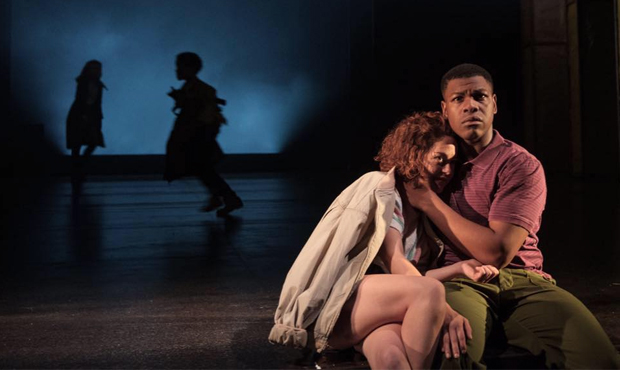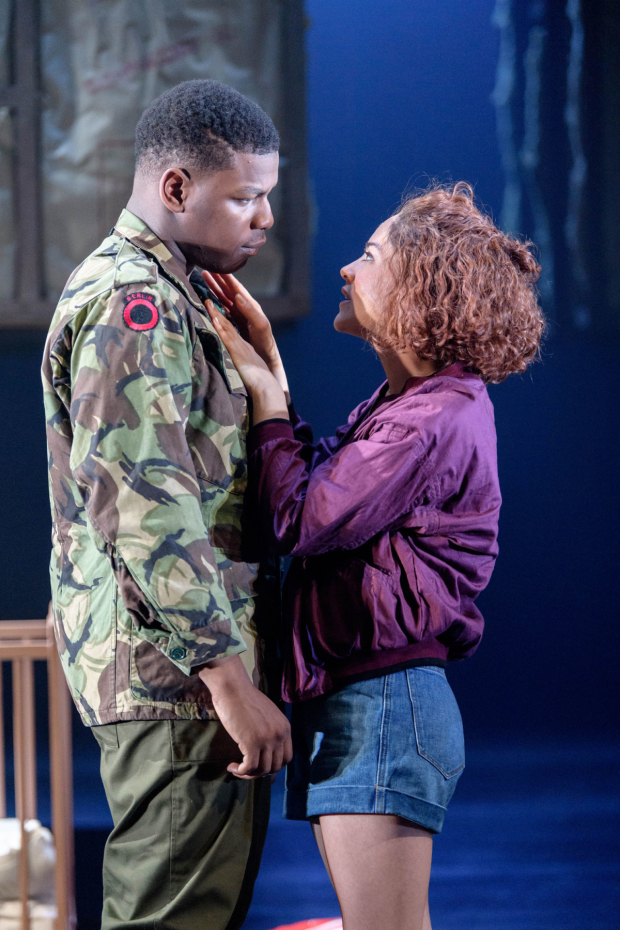It doesn't matter how radically a piece has been adapted, the key is whether it works

© Manuel Harlan
When is a Woyzeck not a Woyzeck? If any single criticism has been levelled at the Old Vic’s revival of Georg Büchner’s masterpiece, it’s that it’s not really Büchner’s masterpiece at all. Star Wars' John Boyega is brilliant as Woyzeck, most reviewers agree, but some argue that he’s not really playing Woyzeck at all.
Jack Thorne‘s new version finds Büchner’s soldier stationed in a divided Berlin in 1981: a British Army recruit who has just served a stint in Belfast. Rather than a diet of peas, he’s been prescribed pills by his doctor. He’s a foster child, forced, at one point, to watch his biological mother engaged in sex work. There are a whole raft of additions, omissions and revisions – new characters, new specifics, new scenes, new structure.
For the Guardian's Michael Billington, all this adds up to "excessive invention." Thorne has taken too many liberties with Büchner’s original. "Where the source is tantalisingly elliptical," he writes, "Thorne bombards us with explanations for Woyzeck’s downfall."
Thorne’s Woyzeck is to the original what Clueless is to Jane Austen’s Emma. It owes a debt, but it is a new thing.
I’d counter that, actually, Thorne leaves us none the wiser. He confounds us with possible causes and so achieves the same effect by different means. While we know too little about Büchner’s Woyzeck to understand his breakdown, we know too much about Thorne’s. It could have been any number of triggers: pills, poverty or petty jealousy, a tortured childhood or a battlefield trauma. Woyzeck’s final words – "I don’t know why I did anything" – stand true. Neither do we.
Anne McElvoy is more absolute in the Evening Standard: "It is not Büchner, so really it should not say it is." For her, Thorne’s version is to the original what Clueless is to Jane Austen’s Emma. It owes a debt – inspired by or based on – but it is a new thing. "A play is, to get all German about it, a Ding an sich – a thing in itself. It is elastic, but too much pulling at its fabric distorts shape and meaning." Pull hard enough and, eventually, you tear it apart.
That’s hard to rebut. Paraphrase every line in Hamlet, and it’s still somehow Hamlet. Cut and condense, chop and change, still Hamlet. But there must, at some point, come a tipping point. David Garrick added a happy ending in the 1750s. That’s a step too far, right? The rest cannot be hip-hip-hooray.
In which case, what’s Woyzeck's? Is it the same play with pills instead of peas? Is it his Britishness? His backstory? The situation in Berlin? The question is all the more complex by the fact that Büchner’s play is unfinished. It’s a bunch of fragments and scenes. Arguably, there is no Woyzeck at all.
Set Othello in contemporary Iraq, and it’s still Othello; Hamlet in space is still Hamlet
McElvoy sees setting as important. This is not, she says, the "poetic distillation of 19th century militarism and disconnection" Büchner intended. Michael Coveney made a similar argument in The Stage last week: the drive to update classics risks changing them altogether. Context matters, in other words. You can pull Chekhov’s characters out of rural Russia, pre-revolution, or Ibsen’s out of buttoned-up 19th century Norway.
Except, clearly, you can – and many great theatremakers have. Set Othello in contemporary Iraq, and it’s still Othello; Hamlet in space is still Hamlet. Why should Shakespeare be a subset of one? Every story is both abstract and particular. Every character, both archetype and individual. As long as the underlying forces remain the same – the archetypes, the relationships, the emotions – the essence of the will survive.
Ivo van Hove faced similar complaints about Obsession. Where, some critics cried, was the Italian heat? How can you take Visconti’s story of the murderous drifter out of Mussolini’s Italy? That, of course, ignores the fact that Visconti took it out of Depression-era California in the first place, jumping off from James M Cain’s The Postman Always Rings Twice. The story still survives – all the more tragic for being pared back to its archetypes.
What matters is whether it works or not; how it stacks up onstage
No adaptation alters an original. Writing a version of Woyzeck doesn’t void the original. It doesn’t replace what Büchner wrote. That text still exists and, should you want to consider its understanding of 19th century militarism, you can pick up a copy and do just that. Thorne’s doing something different and, of course, it’s only by doing something different that we discover the possibilities in a play text. Without Peter Brook’s white-box production, would we have spotted the subconscious at work in Midsummer Night’s Dream?
There are no right answers to a play. Every new production, every new adaptation, every new version, is ultimately just a proposition. What matters is whether it works or not; how it stacks up onstage. That’s a theatremaker’s only duty – to make good theatre. Maybe, then, a title is just a title. It offers a way in and anchors a play to the work or to other plays. Alice Birch relocates Nikolai Leskov’s novel Lady Macbeth of Mtsensk to northern England. Keeping (most of the title) lets us know what we’re watching.

Sometimes, of course, we need something new. Sometimes, shape and meaning have to be distorted. Birch refines the gender politics in Leskov’s story, Thorne reframes the science in Woyzeck. Branden Jacobs-Jenkins goes further still in An Octoroon – an postmodern version of Dion Boucicault’s antebellum melodrama The Octoroon. Revive that play as written, serve it neat, and you’re resuscitating a racist old relic. Remix it, as Jacobs-Jenkins has, and you can make it count again – honouring a once progressive play, while also critiquing its regressive racial representations. He sticks to Boucicault’s story, but changes the way that we see it using commentary, black/white/redface and other alienation devices.
Maybe that’s one we need: something old, something new. What if a Woyzeck shouldn’t be a Woyzeck after all?











